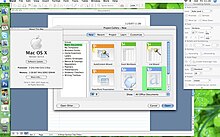 Microsoft Word for PowerPC on Intel | |
| Developer(s) | Apple Inc. |
|---|---|
| Operating system | Mac OS X 10.4.4–10.6.8 (Intel) macOS 11.0–present (ARM) Linux guest[1] |
| Type | Binary translation, emulation |
| Website | https://support.apple.com/en-us/102527 |
Rosetta is a dynamic binary translator developed by Apple Inc. for macOS, an application compatibility layer between different instruction set architectures. It enables a transition to newer hardware, by automatically translating software. The name is a reference to the Rosetta Stone, the artifact which enabled translation of Egyptian hieroglyphs.[2]
The first version of Rosetta, introduced in 2006 in Mac OS X Tiger, was part of the Mac transition from PowerPC processors to Intel processors, allowing PowerPC applications to run on Intel-based Macs. Support for Rosetta was dropped with the release of Mac OS X Lion (10.7) in 2011.
Rosetta 2, introduced in 2020 as a component of macOS Big Sur, is part of the Mac transition from Intel processors to Apple silicon, allowing Intel applications to run on Apple silicon-based Macs.[3]
- ^ "Running Intel Binaries in Linux VMs with Rosetta". Apple Inc. Retrieved August 7, 2022.
- ^ Norr, Henry (January 27, 2006). "Core Duo iMacs debut speedy new chips". Macworld.
- ^ Warren, Tom (June 22, 2020). "Apple is switching Macs to its own processors starting later this year". The Verge. Retrieved June 22, 2020.